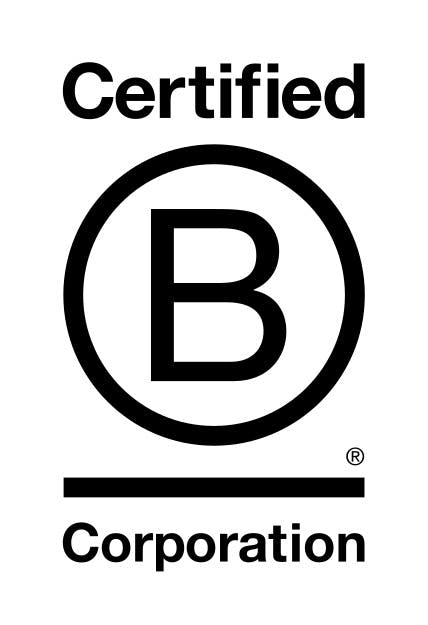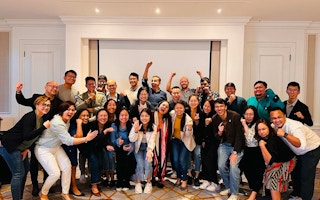Eco-Business has been officially certified as a B Corp, a global movement that recognises the sustainability standards of organisations.
It is the 34th company in Singapore and the first media company locally to gain the seal of approval issued by the globally-recognised scheme for meeting its high standards on social and environmental performance.
The firm adds to a growing list of Asian firms looking to showcase how their business generates positive impact for customers and employees. B Lab, the United States-based non-profit behind the sustainable business certification scheme, has given the status to more than 7,300 companies in over 90 countries worldwide, since it was founded in 2006.

Businesses can display the “B Corp” logo after being certified by the US-based non-profit.
Companies applying to display the official black-and-white logo of endorsement undergo a rigorous assessment in areas such as governance structure, workforce development, supply chain management, local economic development and environmental metrics.
Eco-Business, founded in 2009, is Asia Pacific’s largest media and business intelligence organisation focused on sustainable development. It publishes daily news and analyses for a business and policy audience, provides advisory and training services for organisations and organises thought leadership events and initiatives. In 2019, it also launched EB Impact, a non-profit focused on delivering youth and education programmes for Asia.
Eco-Business supports EB Impact in all its programmes and is formally committed to donate the equivalent of 5 per cent or more of its time through pro-bono services to EB Impact and its partners.
The company started pursuing B Corp status about a year ago and achieved certification last week.
It scored 96 points in the B Corp assessment, which has a passing grade of 80. About a third of businesses that apply get certified, and the average score of applicants is just over 50.
Jessica Cheam, founder and managing director of Eco-Business, said that achieving the B Corp status is a “huge milestone” for the business.
“While we are a small organisation and not subject to any disclosure requirements, we want to demonstrate our commitment to high social and environmental impact,” Cheam said. Eco-Business has about 30 staff in Singapore, China, India, the Philippines and Malaysia.
“We hope to continue helping organisations and communities have a voice, make sense of the complex issues we face today, and to find constructive ways forward together,” Cheam added.
She noted that B Corp is a credible framework with rigorous standards that allows firms to benchmark themselves with theirs peers, adding: “We devoted a lot of time and resources to this process and believe it is the right thing to do. We are thrilled to now be officially certified and will continue to improve our impact in the years to come.”
Eco-Business executive director Junice Yeo said measures the firm took to attain B Corp status included reporting its operational footprint, and embarking on measuring “Scope 3” or indirect emissions from its supply chain.
Yeo, who is based in Beijing and leads the firm’s advisory and training efforts, shared that Eco-Business has been helping other companies on their sustainability journey over the years, but the B Corp process, which involves “getting the house in order” has been “quite a different experience”.
“Each business is unique and we too had to make strategic decisions in our process of integrating impact into business operations,” she said, adding that verification and accreditation are effective ways to ensure the right governance is put in place.
“Attaining the B Corp certification is just the first step in proving that there is a business case in sustainability… Our ability to influence change and walk the talk will be the true testimony to our success,” said Yeo.
“
We hope to continue helping organisations and communities have a voice, make sense of the complex issues we face today, and to find constructive ways forward together.
Jessica Cheam, founder and managing director, Eco-Business
The B Corp movement has been gaining momentum in Asia, especially after corporate recognition of environmental, social and governance (ESG) issues shot up amid the Covid-19 pandemic. The official website now lists over 250 certified businesses in the region, up from 135 in 2021 and nine in 2015. Many of the recognised firms in the region are based in China, South Korea and Taiwan.
Many B Corp firms are small to medium-sized ventures. In Singapore, they include Foreword Coffee Roasters – which hires staff with disabilities and special needs, Pearl Consulting – a boutique firm working on social and environmental issues, and ABC Impact – a Temasek-linked private investor with portfolio firms dealing in agriculture technology, healthcare and clean energy.
There are also larger firms like Olive Tree Estates, a property developer listed on the Singapore Exchange. Globally, B Corp giants include clothing retailer Patagonia and coffee pods maker Nespresso.
Certified firms are reassessed every three years, and must continually improve their social and environmental credentials.

















